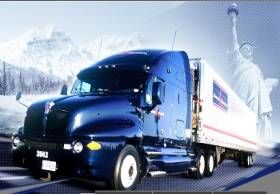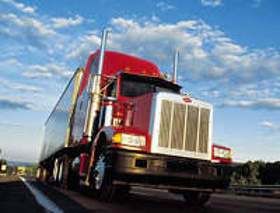Swift Questions
Topic 17083 | Page 2
Celadon is a fine choice. Are you prepared to do some team driving? I think they require a certain amount of teaming for their new drivers.
Also, it will be very unusual for you to cross the border into Mexico. My company has dedicated lanes into Mexico also, but it is next to never that they have a gringo cross the border. Usually you will drop the trailer at a drop yard in a border town, and a Mexican driver will pick it up.
You will cross the Northern border, and possibly often with Celadon. They have some good accounts that go up that way regularly.
Drivers who go through the Celadon Driving Academy are required to team drive for 120K team miles.
Graduates of other schools are not required to team drive (other than during training of course).
Training is for 10K miles (driven by student). Trainer is in the passenger seat for the first 5K miles and team for the second. Pay during training is $0.25 per mile rather than the flat rate paid by some carriers.
I like the fact that Celadon starts new drivers off with performance based pay rather than a flat rate...
Have we done a good job of hijacking this thread?
Seriously considering swift. Various reasons, one being work history another, I live twenty minutes from the Richmond terminal. What kind of freight and routes run out of Richmond? Flatbed or tankers out of this area? Any and all information is welcome, and thanks in advance.
I don't live near the Richmond terminal but I do live near the Denver terminal and I agree with Errol. You don't have to live near a terminal, but you will have alot more opportunities if you do.
Terminal:
A facility where trucking companies operate out of, or their "home base" if you will. A lot of major companies have multiple terminals around the country which usually consist of the main office building, a drop lot for trailers, and sometimes a repair shop and wash facilities.
John, I have a very good friend who drives for Hyndman, Celadon's Canadian company. You will most likely have the opportunity to cross into Canada, but it's also possible they will have you swap with one of their Canadian drivers to take freight across the northern border.
As far as Mexico, you will never cross into Mexico with them, and you don't want to. They have a huge drop yard in Laredo, and Mexican drivers take the freight across the southern border. Or you will deliver to a forwarder who then ships the freight across. This is pretty much across the board for all major carriers. Mexico is not a pretty place for truck drivers. It can be dangerous and hard to navigate. That's why they use Mexican drivers who come across.
Dm:
Dispatcher, Fleet Manager, Driver Manager
The primary person a driver communicates with at his/her company. A dispatcher can play many roles, depending on the company's structure. Dispatchers may assign freight, file requests for home time, relay messages between the driver and management, inform customer service of any delays, change appointment times, and report information to the load planners.
Approximately what's the insurance cost with family at swift? Anyone using the 401k? Those who use cpap , is swift providing inverter? Or am I responsible?
CPAP:
Constant Positive Airway Pressure
CPAP is a breathing assist device which is worn over the mouth or nose. It provides nighttime relief for individuals who suffer from Sleep Apnea.
HOS:
Hours Of Service
HOS refers to the logbook hours of service regulations.I don't know if you've seen these or not but we do have tons of information on Swift:
- Swift Company-Sponsored Training Program Review
- Swift Transportation Company Review
- Forum Conversations Tagged "Swift Transportation"
Company-sponsored Training:
A Company-Sponsored Training Program is a school that is owned and operated by a trucking company.
The schooling often requires little or no money up front. Instead of paying up-front tuition you will sign an agreement to work for the company for a specified amount of time after graduation, usually around a year, at a slightly lower rate of pay in order to pay for the training.
If you choose to quit working for the company before your year is up, they will normally require you to pay back a prorated amount of money for the schooling. The amount you pay back will be comparable to what you would have paid if you went to an independently owned school.
Company-sponsored training can be an excellent way to get your career underway if you can't afford the tuition up front for private schooling.

I'm using the 401K and both your trainer's truck and your solo truck will be setup with inverters. Just make sure and tell them when signing up and remind them again at orientation. You will probably need a Dr's note stating that you need to be on a cpap machine for sleeping. We just used the recommendation from the DOT Dr for mine.
DOT:
Department Of Transportation
A department of the federal executive branch responsible for the national highways and for railroad and airline safety. It also manages Amtrak, the national railroad system, and the Coast Guard.
State and Federal DOT Officers are responsible for commercial vehicle enforcement. "The truck police" you could call them.
CPAP:
Constant Positive Airway Pressure
CPAP is a breathing assist device which is worn over the mouth or nose. It provides nighttime relief for individuals who suffer from Sleep Apnea.
Wow, we have a lot of different conversations going on within this thread. I'm as much to blame and anyone else. My apologies to the OP.
Meanwhile:
ChickieMonster,
Thanks for your feedback. I guess I can contain my sorrow about not driving in Mexico. Perhaps I can park the tractor and walk across the border from time to time...
My goal is to drive and visit as much of North American as possible. I guess Mexico is not one of the possibilities... but then again neither is Bermuda. And according to the United Nations, Mexico is officially part of Central America anyway. Sour grapes anyone?
New Reply:
New! Check out our help videos for a better understanding of our forum features

















Preview:
This topic has the following tags:
Prime Inc Swift Transport Choosing A Trucking Company Employment Verification Pre-Employment Screening Program Truck Driver Training







 TT On Facebook
TT On Facebook
Thanks G-Town. That changes the numbers of course: just a fourteen percent difference in base rate. The bonuses or other adjustments to driver's compensation are still unknown in this conversation. And yes, I was hoping to reinforce your point.
Old School: I intend to go with Celadon. Like Swift, they have dry-van, refrigerated, and flat-bed (although you need one year experience before starting flat-bed), as well as OTR , regional , dedicated, and local divisions.
My plan is to follow in Brett's footsteps and travel as much of the North American continent as possible. That's the big item for me in that Celadon is built upon their Canadian and Mexican freight lanes. Driving for Celadon will give me the opportunity to see all 48 contiguous states and drive Canada and Mexico.
Their starting pay of $0.29 per mile is a bit low, but there are pay raises at 3 and 6 months that take the rate to $0.31 and then $0.33. There are additional raises and other bonuses that should keep the pay at a competitive rate. However, since I will be closing my home (will be renting it our for at least the first year, and will sell it if I am still happy with trucking after my one year anniversary) and selling my car, my personal expenses will be very low, so my disposable income should be more than adequate.
There are, of course, more than a few assumptions in my plan. So if anyone has corrective advice for me, by all means, please share it!
(Someday I may learn how to offer short and simple answers to short, simple questions...)
Regional:
Regional Route
Usually refers to a driver hauling freight within one particular region of the country. You might be in the "Southeast Regional Division" or "Midwest Regional". Regional route drivers often get home on the weekends which is one of the main appeals for this type of route.
OTR:
Over The Road
OTR driving normally means you'll be hauling freight to various customers throughout your company's hauling region. It often entails being gone from home for two to three weeks at a time.